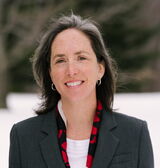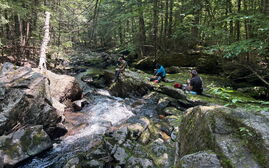In her first state of the state address, Mills pushes for stronger economy
More Information
Initiatives to support business, bolster job training and creation, and expand broadband, affordable housing, health care and more are all on Gov. Janet Mills' agenda for 2020, she told Maine residents Tuesday.
In her first state of the state address, Mills, who took office last year, said national politics have made the times trying. But she's optimistic Maine can get things done to improve its economy and quality of life without partisan squabbling. "We are not Washington; we are Maine," she said repeatedly throughout the address.
“These are trying times. Politics from Washington and beyond are marked by rancor, divisiveness and fear,” she said. “During this volatile presidential election year, the noise is deafening, turning us away from the security and saneness of our own small outpost. Tariffs and trade wars, threats of terrorism and partisan fighting paralyze the nation’s capital.
"But here in Maine, we are doing what Mainers have done for more than two centuries: putting our shoulder to the wheel and working across the aisle to get things done for Maine people," she said.
Specific highlights of 2019 included:
- Enacting "a visionary" paid leave law, workers compensation reform and important gun safety legislation.
- Restoring the Maine Indian State Tribal Commission and empowering it to become a forum for substantive communication, problem solving, and dispute resolution.
- Negotiating seven collective bargaining agreements "in timely fashion that provided cost-of-living raises, first-time parental leave and a long overdue wage study."
She covered a variety of areas in the address, most touching in some way on business and the economy.
Economy
"I am pleased also to report to you tonight that Maine’s economy is on solid footing and is growing," Mills said. "Revenues are up, our gross domestic product is up, housing starts, construction and auto sales are up; and the state budget continues to have a healthy surplus."
In 2019, the private sector created 5,300 jobs this past year, her administration helped 800 people with disabilities find and keep jobs and the unemployment rate decreased from 3.5% to 2.8%. She also cited $75 million in property tax relief. "Just look in your mailbox, about 300,000 of you should receive a $104 check, thanks to the bipartisan budget passed last year."
She said, though, it's important to remain cautious. "The Revenue Forecasting Committee and the Consensus Economic Forecasting Commission both express cautious optimism about the Maine economy in the near-term, recognizing 'the uncertainty surrounding national fiscal and trade policies that could impact future economic growth.'
"We must be ready for any downturn, any changes. We must remain resilient," she said.
In 2020, Mills:
- Is "committed" to setting aside at least another $20 million for the rainy day fund;
- Plans to move forward on the 10-year economic plan that has a goal of bringing 75,000 people to the state;
- Supports increased funding for the Maine Seed Capital Tax Credit;
- Supports the Maine Affordable Housing Tax Credit, proposed by Sen. Ryan Fecteau, D-Biddeford. "Send that bill to my desk and I will sign it," Mills said;
- Proposes that the Legislature fund $15 million to expand broadband; and
- Proposes the Legislature send a bond to referendum that provides "much-needed funding for the Land for Maine’s Future program," which will help preserve working farms and working waterfront.
Health care, opioids and child abuse
"We cannot have a healthy economy without a healthy workforce," Mill said. "That is why my first act upon taking office was to expand Medicaid to provide health care to more Maine people. More than 57,000 Mainers have accessed life-saving health care."
Legislation that protected health care for more Mainers, prescription drug reform and $75 million over two years for nursing homes was progress, she said. "But there is more we must do, especially for small businesses. Maine’s small group insurance market has seen increasing premiums and decreasing enrollment, making it difficult for business owners to offer coverage to their employees."
In 2020:
- She asks for passage of LD 2007, the Made for Maine Health Coverage Act;
- She will create an Opioid Overdose Review Panel to review overdose deaths, like the panels that review maternal and child deaths, to learn as much as we can to improve our response to this epidemic.
- She asks the Legislature to fund another 20 Department of Health and Human Services positions to respond quickly and effectively to reports of child abuse or neglect.
Education
"In our society, education is that pathway to success and a key to addressing our workforce needs as well," she said. "Equal access to a good education levels the playing field for every student, of every age, in every ZIP code in Maine."
In 2020:
- She is asking the Legislature to fully fund the second year of the higher education budget, which was cut last spring.
- Calls for simplifying debt relief programs for students, like the Educational Opportunity Tax Credit to help more graduates retire their debt.
- Calls for boosting the Educators for Maine Loan Forgiveness Program "to incentivize young teachers to work in the underserved areas which desperately need them."
- Asks the Legislature fund equipment upgrades for the states Career Technical Education programs.
Transportation infrastructure
"Just last week the Maine DOT released its three-year work plan," Mills said. " Chronic underfunding and cost increases keep us from maintaining our essential infrastructure. With a shortfall of as much as $232 million a year, it’s time to put our heads together and get creative."
She signed a resolve to keep the Blue Ribbon Commission that's studying funding options to continue this year, and she wants the panel "to keep working on this for as long as it takes."
Climate change
"I told the 193 delegates to the United Nations last fall, Maine won’t wait. And I mean it," she said.
In 2019, the state:
- Created the bipartisan Maine Climate Council and became the 22nd state to join the U.S. Climate Alliance;
- Committed to achieving 80% renewable energy by 2030 – "one of the most ambitious renewable energy standards in the nation";
- Opened the door to offshore wind projects, supported electric vehicles and promoted the installation of heat pumps statewide;
- Removed the cap on community solar and fixed net metering. "At the Blaine House alone, the new array of solar panels has already saved the equivalent of one ton of carbon dioxide emissions."
In 2020, the state must continue to:
- Move away from oil as a primary source for heat;
- Reduce reliance on gas for transportation, which is 54% of Maine greenhouse gas emissions;
- Support innovative businesses;
- Embrace energy storage and other new technology.
About offshore wind, she said that across the Northeast it's "generating thousands of jobs in the development of thousands of giga-watts of renewable electricity," and is poised to become a one trillion-dollar industry by 2040. "Maine will not be left behind."
The state has started on it with legislation that has allowing the Public Utilities Commission and the University of Maine to build and launch the nation’s first floating offshore wind demonstration project, Maine Aqua Ventus. "That commitment is just the beginning of our effort to use the Gulf of Maine and all the world’s oceans to slow the warming of our planet," she said.
She said she plans to visit Scotland this spring to see the offshore wind platforms they are using to supply that country with clean renewable energy.
She also said Mitigating the effects of climate change and moving Maine toward a clean energy future "requires that our utilities be reliable and resilient – and that they put Maine consumers first."
"For years we have allowed electrical utilities a monopoly on our transmission and distribution lines," she said. "Today few are happy with the results of the regulatory framework under which these utilities operate, based primarily on setting rates that allow a reasonable profit to the utilities with little degree of benefit to the public.
"I ask your guidance and your help in making sure that these foreign corporations to whom we accede the privilege of operating in our state, are answerable to Maine, not to Spain or some other foreign country."
Action from tragedy
Mills cited the deaths of state police detective Ben Campbell and Farmington Fire Capt. Michael Bell in moves to increase support of first responders.
Campbell died when he was struck by a tire from a passing truck on Interstate 95 after he stopped to help a stranded motorist. His wife, Hilary Campbell, of Millinocket, was at Tuesday's address.
She asked the Legislature to, this session, increase the state’s benefit for families of first responders. "The current benefit is shamefully inadequate to the sacrifice of those who have given their lives in the line of duty," she said. "It is a simple thing to do. The right thing to do."
Bell, was killed in a propane gas explosion in September in Farmington that injured six others. Mills is creating a scholarship, using money from the governor's contingency fund, to train young people in fire suppression, and is also supporting legislation to boost retirement benefits for firefighters and EMS workers.
Bell's brother, Fire Chief Terry Bell, who was injured in the explosion, was in attendance Tuesday.
Inclusion and the future
Mills, who is the state's first female governor, also made a pitch to add the Equal Rights Amendment to the state's constitution.
"After decades of debate and 46 years after Maine ratified the Equal Rights Amendment to the United States Constitution, it is time to do what 26 other states have done: Preserve equality of rights regardless of sex," Mills said. "Pass the Equal Rights Amendment to the Maine Constitution."
Paraphrasing Supreme Court Justice Ruth Bader Ginsburg, Mills said, "I would like my granddaughters, when they pick up the Maine Constitution, to see that language — that women and men are persons of equal stature — I’d like them to see that it is a basic principle of our society."
As far as what the future holds, in general, she predicted, at times tongue-in-cheek, that in 50 years:
- There will be data centers across Maine, buried in granite, cooled by geothermal cells, providing enough spinoff heat to run a town for an entire winter.
- Skyscrapers and homes across the country will be built with cross laminated timber, invented and manufactured in Maine.
- LL. Bean will still be selling boots, but delivered by robots — "they will be good for spending a weekend hiking on the moon."
- There will be high speed passenger rail from Freeport to Lewiston and all the way to Montreal.
- There will be high-speed internet all across the state "and maybe even cellphone service on 295."
- "And the governor of Maine, whoever she is, will be making $70,000 a year," she said, to laughter.
"But know this," she added. "Everybody will want to live here. Everybody will want to stay here."














0 Comments